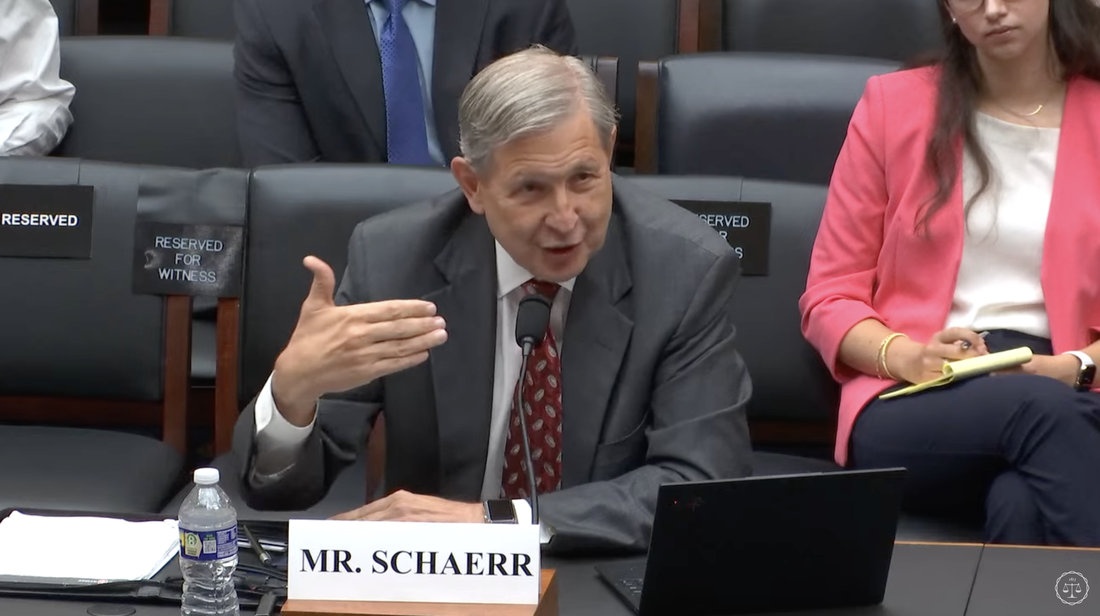PPSA’s Gene Schaerr Appeals to Congress to Assert Its Authority to Protect Americans’ Privacy and the Fourth AmendmentEnd the “Game of Surveillance Whack-a-Mole" Gene Schaerr, PPSA general counsel, in testimony before a House subcommittee on Friday, urged Congress to assert its prerogative to interpret Americans’ privacy and Fourth Amendment rights against the federal government’s lawless surveillance.
Schaerr said the reauthorization of a major surveillance law this year is a priceless opportunity for Congress to enact many long-needed surveillance reforms. There is, Schaerr told the Members of the House Judiciary Subcommittee on Crime and Government Surveillance, no reason for Congress to defer on such a vital, national concern to the judiciary. Congress also needs to assert its authority with executive branch agencies, he said. For decades, when Congress reforms a surveillance law, federal agencies simply move on to other legal authorities or theories to develop new ways to violate Americans’ privacy in “a game of surveillance whack-a-mole.” Schaerr said: “As the People’s agents, you can stop this game of surveillance whack-a-mole. You can do that by asserting your constitutional authority against an executive branch that, under both parties, is too often overbearing – and against a judicial branch that too often gives the executive an undeserved benefit of the doubt. Please don’t let this once-in-a-generation opportunity slip away.” Schaerr was joined by other civil liberties experts who described the breadth of surveillance abuse by the federal government. Liza Goitein of the Brennan Center for Justice at NYU Law School said that FISA’s Section 702 – crafted by Congress to enable foreign surveillance – has instead become a “rich source of warrantless access to Americans’ communications.” She described a strange loophole in the law that allows our most sensitive and personal information to be sold to the government. The law prevents social media companies from selling Americans’ personal data to the government, but it does not preclude those same companies from selling Americans’ data to third-party data brokers – who in turn sell this personal information to the government. Federal agencies assert that no warrant is required when they freely delve into such purchased digital communications, location histories, and browsing records. Goitein called this nothing less than the “laundering” of Americans’ personal information by federal agencies looking to get around the law. “We’re a nation of chumps,” said famed legal scholar and commentator Jonathan Turley of the George Washington University Law School, for accepting “massive violations” of our privacy rights. He dismissed the FBI’s recent boasts that it had reduced the number of improper queries into Americans’ private information, likening that boast to “a bank robber saying we’re hitting smaller banks.” Many members on both sides of the aisle echoed the concerns raised by Schaerr and other witnesses during the testimony. Commentary from the committee indicates that Congress is receptive to privacy-oriented reforms. Gene Schaerr cautioned that Congress should pursue such a strategy of inserting strong reforms and guardrails into Section 702, rather than simply allowing this authority to lapse when it expires in December. Drawing on his experience as a White House counsel, Schaerr said the “executive branch loves a vacuum.” Without the statutory limits and reporting requirements of Section 702, the FBI and other government agencies would turn to other programs, such as purchased data and an executive order known as 12333, that operate in the shadows. Despite this parade of horribles, the hearing had a cheerful moment when it was interrupted by the announcement of a major reform coalition victory. The Davidson-Jacobs Amendment passed the House by a voice vote during a recess in the hearing, an announcement that drew cheers from witnesses and House Members alike. This measure would require agencies within the Department of Defense to get a probable cause warrant, court order, or subpoena to purchase personal information that in other circumstances would require such a warrant. Schaerr was optimistic that further reforms will come. He said: “Revulsion at unwarranted government surveillance runs deep in our DNA as a nation; indeed, it was one of the main factors that led to our revolt against British rule and, later, to our Bill of Rights. And today, based on a host of discussions with many civil liberties and other advocacy groups, I’m confident you will find wide support across the ideological spectrum for a broad surveillance reform bill that goes well beyond Section 702.” Comments are closed.
|
Categories
All
|


 RSS Feed
RSS Feed